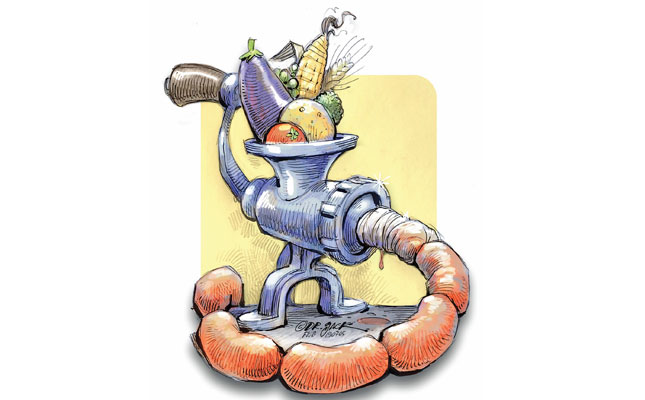
According to the Food and Agriculture Organization of the United Nations (FAO), nearly half of the world’s crop harvest is required to feed a livestock population of 1,4 billion cattle, one billion pigs, 20 billion chickens, and 1,9 billion sheep and goats.
Agricultural production directly for human consumption accounts for just 37% of the total harvest (ahead of biofuel, industrial production and others).
READ Small land, big dreams for urban veggie farmer
Solutions for increasing the efficiency of conventional meat production to meet growing meat demand have been almost exhausted.
Arable land is shrinking due to global warming and sprawling cities, and can only be expanded at the cost of losing valuable natural habitats such as rainforests.
The availability of fresh water, particularly in drier areas, is also a problem. According to the FAO and Aquastat, global agriculture today already uses approximately 70% of blue water. This is hardly sustainable.
Resistance to modern agrochemicals is on the rise, soil compaction poses problems, and erosion is an issue. Moving from field to feedlot sees additional challenges to conventional meat production, from antibiotic use to zero tolerance for animal harm.
The agriculture and meat industries have, for the most part, tried to address these difficulties by increasing the efficiency of conventional production methods. But in the long run, this will not be enough to cope with the pressing problems of our food system.
Alternatives: the only long-term solution
As a result of all these factors, a number of meat alternatives are evolving, each with the potential to disrupt the multibillion-dollar global meat industry.
- Novel vegan meat replacements
These products are made completely of plant-based inputs, but due to a sophisticated production process, their sensory profile is considerably closer to meat than the classic vegan meat replacements that have existed for several years. Start-ups in this field, such as Impossible Foods, Just, and Beyond Meat, were launched about nine years ago, and up to 2018 had received financing of US$900 million (about R12,8 billion). Their products are already available in restaurants and supermarkets in several countries. - Cultured meat
Starting with a cell extracted from a living animal, the result is a product identical to conventionally produced meat. While several of the first start- ups in this field have conducted public and private tastings of various prototypes, no commercial products have yet been sold.
According to most industry experts, novel vegan meat replacements represent a transition phase toward cultured meat. The latter will be the most relevant in the long term, thanks to the further development and industrialisation of biotechnological processes, which will see such products able to satisfy diverse consumer types and preferences.
READ Meatmasters: bred for tough conditions and good meat
The global market for plant-based meat alternative products was approximately $4,6 billion (R65,5 billion) in 2018, with a growth projection of 20% to 30% per year (depending on region) for the next several years.
Emerging market and technology leaders in the field of novel vegan and cultured meat replacement have become an integral part of prestigious start-up regions such as California, Israel and the Netherlands. Large corporations such as Cargill, Tyson, Merck, Google, UBS and PHW Group have already invested in these companies.
The inputs for conventional and novel vegan meat are relatively similar, consisting mainly of energy, water and a number of arable crops (wheat, potatoes, beans and coconut oil).
The material input for cultured meat is a nutritious medium that consists mainly of amino acids and glucose to feed the cells.
The inputs for this can be extracted from biomass, including livestock by-products and several types of plants, especially soya bean, peas, maize and red sugar beets.
While glucose and amino acids are relatively cheap, the molecules that stimulate meat cells to differentiate are currently very expensive. It is therefore not surprising that many research and development initiatives are aimed at reducing this crucial cost.
Comparative conversion rates
According to AT Kearney’s field research, about 1,5kg of soya beans, peas, maize and red sugar beets is required to produce 1kg of cultured meat, a conversion rate of about 70%.
As technology and production methods evolve, this rate should improve.
For novel vegan meat replacements, about 1,3kg of arable crops is required to produce 1kg of plant-based meat, a conversion rate of approximately 75%.
READ Plant-based movement opportunity for fresh produce industry
Nevertheless, plant-based meat has the same nutritional profile as conventional meat, and requires significantly less water and energy to produce.
The conversion rate of conventional meat can no longer be substantially improved and lags far behind meat replacement products.
Cultured and novel vegan meat replacements have other key advantages in terms of product design, such as the opportunity to customise the muscle-fat-nutrient ratio of the meat (for example, replacing fatty acids with omega and adding nutrients).
In addition, the shelf life is longer, and less cooling is required for transportation as there are no bacteria, such as salmonella and Escherichia coli, present to foster the degradation process.
The scenario in 10 years
Based on an AT Kearney analysis, approximately one-third of global meat supply will be provided by these new technologies within the next 10 years.
Novel vegan meat replacements will show a strong growth in the transition phase (until 2030).
READ Consumer trends are crucial for production decisions
Cultured meat, with an annual growth rate of 41% per year, will outgrow novel vegan meat replacements between 2025 and 2040 due to technological advances and consumer preferences. New biotechnology methods will disrupt not only the meat industry, but the entire food industry, because products such as milk, egg white, gelatine and fish can be created with similar technology.
The views expressed in our weekly opinion piece do not necessarily reflect those of Farmer’s Weekly.
US management consulting company AT Kearney focuses on strategic and operational CEO-agenda issues facing businesses, governments and institutions. This article is an abstract from its report, ‘How will cultured meat and meat alternatives disrupt the agricultural and food industry?’ by Dr Carsten Gerhardt, Gerrit Suhlmann, Dave Donnan et al.










